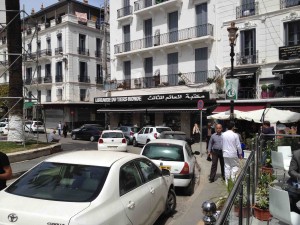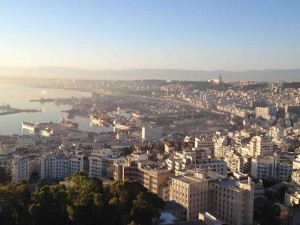Today’s New York Times carried an article reported from the Algerian capital, Algiers, by staff reporter Aida Alami. What a waste of a reporting opportunity! This was the first time an NYT correspondent had been writing from inside this important North African country for a long time. Previous NYT pieces about Algeria were one on March 1 on some serious antifracking protests in the south, reported by Carlotta Gall from who knows where (no dateline given, and no sourcing for what she wrote, either); and an AP story from last December 20 about Algeria feeling the effects of the oil price collapse… So clearly, for Ms. Alami to get into Algeria was a major opportunity for some good, well-informed, on-the-ground reporting.
She flubbed it.
Her article is headlined “In Algeria, Entrepreneurs Hope Falling Oil Prices Will Spur Innovation”. It consists almost entirely of interviews with two Algerian guys aged 30 and 38 who founded a PR company in the capital, Algiers, and recently (last February) organized a conference on “innovation” and “success”, under the rubric “Fikra” (Thought). The other named source is someone described as a senior analyst at the political-risk research firm Eurasia; but his location is not disclosed, so it’s likely that Alami spoke to him outside Algeria.
Does Ms. Alami provide us with any flavor of what life is like in today’s Algiers? None at all! As it happens, I was in the country for most of this past week, and in Algiers itself for most of that period. I could tell you about the bustling downtown pedestrian zones, the busy port operations, the stifling traffic jams, the tens of thousands of students at the capital city’s three massive universities, the construction zones (often completely Chinese-staffed and -run) all around the city, the bookstores and restaurants, the well-cleaned streets often with beautiful streetside plantings, etc etc. You get no sense of the city or the lives of its people whatsoever from Ms. Alami’s thin and ill-reported piece.
But the piece is far worse than actually ill-reported. It is massively misreported, including in the following ways:
(1) Ms. Alami writes:
Since [the] French colonial era ended in the early 1960s after a bloody war, Algeria has been relatively closed to the world culturally, politically and economically.
This is absolute nonsense– and is belied by the little bios she provides for the two entrepreneurs she talked to. Of one, she says he “travels between Nice, in France, where he has another company” (though she doesn’t name the other place where he travels between, I assume it’s Algiers.) Of the other, she says he was educated at King’s College, London…
One of the the things I did in Algeria this past week was attend an international conference of librarians, who came to the east-Algerian city of Constantine from many parts of the world. Now, it is true that a handful of foreign participants in our conference– as Ms. Alami also reported of February’s Fikra conference– did not get their visas in time to attend. But organizers of my conference said that at least one participant had been refused permission to come to Algeria by her employer, a major research institute in France… Go figure.
Culturally, Algeria has produced numerous fine writers renowned throughout (mainly) the French-speaking world; a unique, indigenous form of hip-hop-fusion music called rai that resounds throughout the whole Mediterranean, and further afield; and numerous world-class soccer players…
The Algerian economy is, as Ms. Alami notes, fueled in a major way by exports of hydrocarbons. This is not at all a country that is “closed to the world economically”!
Plus, the way she writes that sentence makes it seem as if, under French colonial rule, everyone in the country had full and wonderful access to the world outside. Totally not true. French colonial rule, like colonial rule everywhere in the world, involved the maintenance of heavy restrictions on the ability of the indigenous people to maintain relations with the rest of the world– or even, under France’s notorious system of “quadrillage“, with compatriots in other districts.
Now, it is true that the rulers of the People’s Democratic Republic of Algeria have had no incentive or desire to embrace integration with the neoliberal, US-led wing of the world economy. But that doesn’t mean it is isolated from the rest of it, at all. (And actually, I believe a lot of Algeria’s natural-gas exports are shipped to the U.S.; plus, a lot of U.S. firms are involved in various hydrocarbon exploration and extraction operations throughout the country– including Halliburton, which was doing the highly contested fracking there.)
(2) Since Ms. Alami’s visit to Algeria is/was such a rarity in the NYT’s reporting, she also definitely owes it to readers to try to describe the country’s tough geostrategic and geopolitical position more fully.
She writes:
The political system has been dominated since independence by one party, the National Liberation Front, while the economy has been choked by cronyism, insider dealing and anticompetitive regulations.
Algeria had its version of the Arab Spring in the 1980s amid another collapse in oil prices. In 1991, the army canceled elections after an initial round was won by Islamists, sparking a decade of civil war and terrorism that killed tens of thousands. Then, military leaders imposed a state of emergency that was lifted only in 2011.
What she does not write is that Algeria, population nearly 40 million, has two deeply troubled neighbors with whom it shares very long, hard-to-police borders. These are Libya and Mali. (A map should have been provided, to show this.) Given the proliferation of terrifyingly well-armed, extreme-Islamist militias in both those countries, today’s Algeria is in a very tough position indeed.
Add to that the fact that the country’s ageing, military-backed President, Abdelaziz Bouteflika, is apparently in a very vulnerable (and not clearly known) health situation with no clear mechanism in sight for organizing a succession… and the country’s politics actually seem much, much more important than the issue Ms. Alami chose to write about: whether two young-ish Algerian entrepreneurs are able to make a go of their PR company or not.
Back in early 2011, Algeria was just one of the many African Union countries that argued strongly against NATO’s use of any force against Libya. In the days leading up to the highly ill-advised NATO bombing of Libya, an African Union mission was actually in Libya, trying desperately to mediate a ceasefire between Col. Qadhafi and the Libyan opposition forces. But France, Britain, and their friends in the Obama White House were determined to go ahead with their bombing of Qadhafi’s forces, which they carried out under the (oh-so-mendaciously misapplied) excuse of a “humanitarian” intervention… And we have all seen what has become of Libya since then.
So nobody in the “west” listened to the anti-war arguments being made by the African Union governments, back in 2011. Today, now that Algeria is de facto and in practice a strong bulwark against any further spread of Al Qaeda and its affiliates in the region, people in the “west” should certainly be eager to learn a lot more about the country’s situation. This, they won’t do by reading silly, inconsequential, and unthinkingly orientialist reporting like that of Ms. Alami.

